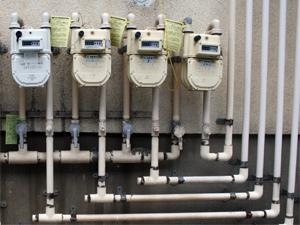forum
library
tutorial
contact

Alas, Energy Efficiency Isn't Sexy
by Marc GuntherGreen Biz, September 16, 2009
|
the film forum library tutorial contact |

|
Alas, Energy Efficiency Isn't Sexy
by Marc GuntherGreen Biz, September 16, 2009 |
 If The Graduate (1967) were remade today, the famous scene where Benjamin Braddock (Dustin Hoffman) gets career advice might have to be rewritten this way:
If The Graduate (1967) were remade today, the famous scene where Benjamin Braddock (Dustin Hoffman) gets career advice might have to be rewritten this way:
Mr. McGuire: I want to say two words to you. Just two words.Energy efficiency is not as sexy as solar power or wind turbines or electric cars. It's not even as sexy as plastics. In fact, it can be stupefyingly dull. It's not much of a punchline. But it matters. It matters a lot.
Benjamin: Yes, sir.
Mr. McGuire: Are you listening?
Benjamin: Yes, I am.
Mr. McGuire: Energy efficiency.
Efficiency isn't as sexy as Mrs. Robinson's stockings
Today, I'm in Indian Wells, Calif., in the southern California desert where I spoke to the Energy and Technical Services Conference of the Food Marketing Institute. About 450 people are here. They are mostly engineers, responsible for the energy operations of America's supermarkets, and the business people who sell them such products and services as micro-channel coil technology, optional variable speed EC motors, refrigerant-based industrial dehumidifiers, advanced aerodynamic fan blades, fluorescent leak detection products, etc. Breakout sessions covered such topics as "Refrigeration Innovation: Evaporative Misting/Cooling" and "The High Cost of NOT Doing Preventative Maintenance" and "Energy Innovation: Target Ventilation Case Study."
Are you still with me?
Here's the thing: These are the kinds of people who, if they do their jobs right, are going to help us solve the climate crisis. As McKinsey & Co. has reported, the U.S. economy can reduce non-transportation energy consumption by 23 percent by 2020, eliminating $1.2 trillion in waste. Judging from a number of conversations that I had with several the engineers here, the energy-saving opportunities in the supermarket industry are really significant. Here are a three quick examples of companies who think there's money to be made in driving efficiency:
It was fitting, I told the group, that FMI's energy experts were meeting in California. This is where you can see the clean energy revolution taking shape. On my flight into Palm Springs, I saw wind turbines on a hillside by the airport and lots of solar panels on roofs. Efficiency is an even bigger success story for California, as Ron Brownstein reports in a excellent feature called The California Experiment in the new issue of The Atlantic:
Efficiency and decoupling have helped California to consume electricity far more thriftily than the rest of America. At the time of the 1973 oil shock, California used about 17 percent less electricity per person than the country at large. Since then... per capita electricity use in the nation has increased by about 50 percent to about 12,000 kilowatt-hours annually. Meanwhile, over that same period, per capita electricity use in California has remained absolutely flat at about 7,000 kilowatt-hours per year. That means the average Californian today uses about 40 percent less electricity per year than the average American.
So the challenge is to spread California's commitment to efficiency elsewhere. The Obama administration gets this. Just this morning, the energy department announced a new $450 million program "designed to catalyze a nationwide energy upgrade" that its experts say could save $100 million annually in utility bills for households and businesses. The idea is to rollout efficiency upgrades much in the way the nation rolled out cable TV or the Internet, as the press release says:
"Energy efficiency isn't just low-hanging fruit; it's fruit lying on the ground. We have the tools to reduce energy use at home and at work and to provide huge savings to families and businesses on their energy bills. But use of these technologies has been far too limited because we lack the simple and effective ways for people to access them," said Energy Secretary Steven Chu.
Now, whether the government can accomplish this, er, efficiently remains to be seen.
But there's no doubt in my mind that energy efficiency will be a much bigger business tomorrow than it is today. No, it's not as sexy or as amusing as "plastics." But if you have a kid who will someday will become a graduate, this could be a good time to think about engineering school.
learn more on topics covered in the film
see the video
read the script
learn the songs
discussion forum
